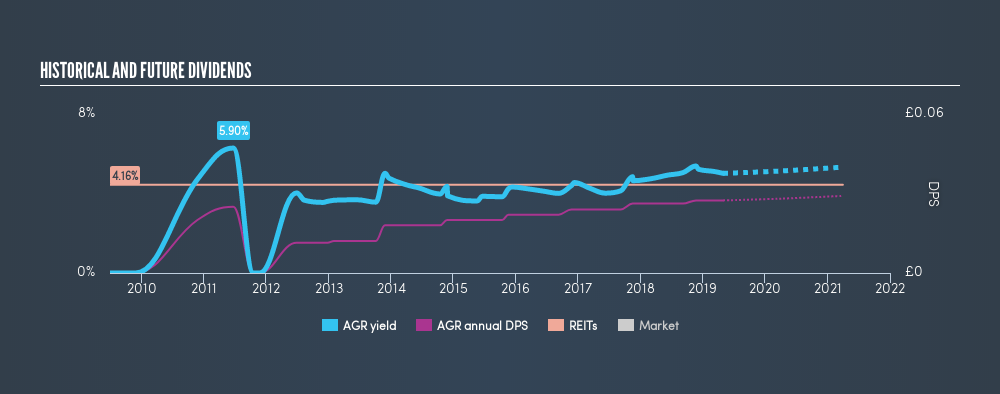- United Kingdom
- /
- Health Care REITs
- /
- LSE:AGR
Read This Before Buying Assura Plc (LON:AGR) For Its Dividend

Want to participate in a short research study? Help shape the future of investing tools and you could win a $250 gift card!
Is Assura Plc (LON:AGR) a good dividend stock? How would you know? A dividend paying company with growing earnings can be rewarding in the long term. Unfortunately, one common occurrence with dividend companies is for investors to be enticed in by the seemingly attractive yield, and lose money when the company has to cut its dividend payments.
With a goodly-sized dividend yield despite a relatively short payment history, investors might be wondering if Assura is a new dividend aristocrat in the making. We'd agree the yield does look enticing. There are a few simple ways to reduce the risks of buying Assura for its dividend, and we'll go through these below.
Explore this interactive chart for our latest analysis on Assura!
Payout ratios
Companies (usually) pay dividends out of their earnings. If a company is paying more than it earns, the dividend might have to be cut. So we need to be form a view on if a company's dividend is sustainable, relative to its net profit after tax. Assura paid out 74% of its profit as dividends, over the trailing twelve month period. This is a healthy payout ratio, and while it does limit the amount of earnings that can be reinvested in the business, there is also some room to lift the payout ratio over time.
Another important check we do is to see if the free cash flow generated is sufficient to pay the dividend. Assura paid out 59% of its cash flow as dividends last year, which does not seem unusual.
REITs like Assura often have different rules governing their distributions, so a higher payout ratio on its own is not unusual.
Is Assura's Balance Sheet Risky?
As Assura has a meaningful amount of debt, we need to check its balance sheet to see if the company might have debt risks. A rough way to check this is with these two simple ratios: a) net debt divided by EBITDA (earnings before interest, tax, depreciation and amortisation), and b) net interest cover. Net debt to EBITDA is a measure of a company's total debt. Net interest cover measures the ability to meet interest payments on debt. Essentially we check that a) a company does not have too much debt, and b) that it can afford to pay the interest. With net debt of more than 5x EBITDA, Assura could be described as a highly leveraged company. While some companies can handle this level of leverage, we'd be concerned about the dividend sustainability if there was any risk of an earnings downturn.
We calculated its interest cover by measuring its earnings before interest and tax (EBIT), and dividing this by the company's net interest expense. Interest cover of less than 5x its interest expense is starting to become a concern for Assura, and be aware that lenders may place additional restrictions on the company as well. High debt and weak interest cover are not a great combo, and we would be cautious of relying on this company's dividend while these metrics persist.
We update our data on Assura every 24 hours, so you can always get our latest analysis of its financial health, here.
Dividend Volatility
From the perspective of an income investor who wants to earn dividends for many years, there is not much point buying a stock if its dividend is regularly cut or is not reliable. Looking at the last decade of data, we can see that Assura paid its first dividend at least eight years ago. Its dividend has not fluctuated much that time, which we like, but we're conscious that the company might not yet have a track record of maintaining dividends in all economic conditions. During the past eight-year period, the first annual payment was UK£0.02 in 2011, compared to UK£0.027 last year. Dividends per share have grown at approximately 4.0% per year over this time.
It's good to see at least some dividend growth. Yet with a relatively short dividend paying history, we wouldn't want to depend on this dividend too heavily.
Dividend Growth Potential
Examining whether the dividend is affordable and stable is important. However, it's also important to assess if earnings per share (EPS) are growing. Over the long term, dividends need to grow at or above the rate of inflation, in order to maintain the recipient's purchasing power. It's not great to see that Assura's have fallen at approximately 8.2% over the past five years. Declining earnings per share over a number of years is not a great sign for the dividend investor. Without some improvement, this does not bode well for the long term value of a company's dividend.
We'd also point out that Assura issued a meaningful number of new shares in the past year. Trying to grow the dividend when issuing new shares reminds us of the ancient Greek tale of Sisyphus - perpetually pushing a boulder uphill. Companies that consistently issue new shares are often suboptimal from a dividend perspective.
Conclusion
When we look at a dividend stock, we need to form a judgement on whether the dividend will grow, if the company is able to maintain it in a wide range of economic circumstances, and if the dividend payout is sustainable. First, we think Assura is paying out an acceptable percentage of its cashflow and profit. Earnings per share have been falling, and the company has a relatively short dividend history - shorter than we like, anyway. In summary, Assura has a number of shortcomings that we'd find it hard to get past. Things could change, but we think there are likely more attractive alternatives out there.
Without at least some growth in earnings per share over time, the dividend will eventually come under pressure either from costs or inflation. See if the 5 analysts are forecasting a turnaround in our free collection of analyst estimates here.
If you are a dividend investor, you might also want to look at our curated list of dividend stocks yielding above 3%.
We aim to bring you long-term focused research analysis driven by fundamental data. Note that our analysis may not factor in the latest price-sensitive company announcements or qualitative material.
If you spot an error that warrants correction, please contact the editor at editorial-team@simplywallst.com. This article by Simply Wall St is general in nature. It does not constitute a recommendation to buy or sell any stock, and does not take account of your objectives, or your financial situation. Simply Wall St has no position in the stocks mentioned. Thank you for reading.
About LSE:AGR
Assura
Assura plc is the UK's leading specialist healthcare property investor and developer.
Established dividend payer with moderate growth potential.
Similar Companies
Market Insights
Community Narratives





